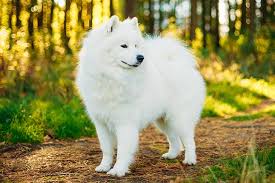
Samoyed
Conditions of detention
Samoyeds adapt well to various living conditions, but they thrive best in homes with access to outdoor spaces where they can exercise and play. They are not ideally suited for apartment living unless they receive ample outdoor activity.
Useful Fact: They enjoy cold weather and can comfortably spend time outdoors in colder climates, thanks to their thick, insulating coat.
Nutrition and diet
A balanced diet rich in protein is essential to support their muscular build and active lifestyle. High-quality commercial dog food or a well-planned homemade diet is recommended.
Useful Fact: Regular feeding schedules and appropriate portion sizes help maintain their weight and overall health, as Samoyeds can be prone to obesity if overfed.
Health
Samoyeds are generally healthy but can be prone to certain conditions such as hip dysplasia, progressive retinal atrophy, and diabetes. Regular vet check-ups are essential to monitor their health.
Useful Fact: Regular dental care is important to prevent periodontal disease, which is common in the breed.
Grooming and care
Their dense, double coat requires regular grooming to prevent matting and tangling. Brushing several times a week and more frequently during shedding seasons is recommended.
Useful Fact: Their coat is self-cleaning, meaning dirt and debris tend to fall off easily, but they do require regular grooming to manage shedding.
Education and training
Samoyeds are intelligent and eager to please but can be independent and stubborn. Early socialization and consistent training are crucial.
Useful Fact: Positive reinforcement techniques work best, as Samoyeds respond well to rewards and gentle guidance.
Toys and entertainment
Interactive toys, puzzle games, and activities that engage their natural instincts, such as pulling and herding, are ideal. Regular mental stimulation is important.
Useful Fact: Providing a variety of toys can help keep them entertained and prevent boredom-related behaviors.
Safety
Given their strong prey drive and friendly nature, Samoyeds should be supervised around small animals and kept on a leash during walks. Secure fencing is necessary to keep them safe and contained.
Useful Fact: Leash training is crucial for their safety during walks, as they may be inclined to chase small animals or wander off to explore.
Accessories
Sturdy collars, leashes, and comfortable bedding are necessary. Given their activity level, durable accessories are recommended.
Useful Fact: A harness can provide better control during walks and help manage their pulling tendency when excited.
Socialization
Early and consistent socialization with other dogs, animals, and people is important to ensure they grow into well-rounded adults.
Useful Fact: Regular playdates and exposure to different environments can enhance their social skills and reduce anxiety.
Travel and Transportation
Traveling with a Samoyed requires planning due to their size and energy levels. They need secure arrangements and ample breaks during long trips to stay comfortable.
Useful Fact: Training them to be comfortable in a car from a young age can make travel easier and less stressful.
Behavior and psychology
Samoyeds are known for their intelligence, loyalty, and friendly nature. They are affectionate with their families and get along well with children and other pets.
Useful Fact: Understanding their need for mental and physical activity can help in managing their behavior and ensuring a happy, well-adjusted pet.
Legal aspects
Owning a Samoyed may be subject to specific regulations, especially in areas with breed-specific legislation.
Useful Fact: Checking local regulations regarding pet ownership can help ensure compliance and prevent legal issues.


